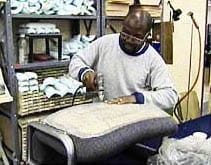by Sergio Hyland
Jalil Muntaqim’s recent article in the San Francisco Bay View, “The 13th Amendment – prison slavery and mass incarceration,” August 2016, underscores the importance of striking the “punishment clause” in the 13th Amendment to the United States Constitution, which legalizes slavery for those human beings convicted of committing a crime.
Strike the punishment clause and the 13th Amendment simply abolishes slavery: “Neither slavery nor involuntary servitude, except as a punishment for crime whereof the party shall have been duly convicted, shall exist within the United States, or any place subject to their jurisdiction.” Here, I’d like to touch on a few points relating to this issue, just to emphasize a part of the struggle that many have overlooked.

The prisoners participating in work stoppages (strikes) in California and around the country aren’t striking simply to acquire higher wages. In many cases, prisoners aren’t even compensated for their labor.
Instead, these prisoners are striking in hopes of bringing awareness to the injustices of prison and the so-called “criminal justice system” as a whole. In some regard, those objectives are being accomplished.
Still, in a society where peaceful resistance is purported to be the correct method of protest, we must ask ourselves why these thousands of prisoners, engaging in peaceful methods of protest, are being retaliated against and punished in the most brutal and inhumane ways?
The answer is simple. The actions of these courageous prisoners – however peaceful – are not constitutionally protected. As long as the punishment clause of the 13th Amendment exists, no prisoner is allowed to protest the conditions of their environment, particularly their status as “slaves” or “indentured servants.”
To be clear, any prison staff member can, at any time, give any prisoner a direct order to perform any task, regardless of how inhumane, exhausting or humiliating, and that prisoner must comply totally, without incident, or be thrown in solitary confinement. All without any compensation.
The prisoners participating in work stoppages (strikes) in California and around the country aren’t striking simply to acquire higher wages. Prisoners are striking in hopes of bringing awareness to the injustices of prison and the so-called “criminal justice system” as a whole.
I’m not sure that the importance of striking this clause has ever been encapsulated within any one article or book on the subject – and it can’t be. But I’d like to at least attempt to shed some light on the issue and the possibilities that come with striking the clause.
First, if this clause were stricken, prisoners could then legally refuse to engage in slave labor “jobs.” The ramifications of such actions are far reaching.
If prisoners withheld their slave labor, the DOC would be forced to replace that slave labor with civilian labor, at civilian pay rates. The result would be an ensuing budget crisis, which would ultimately be unsustainable.
The costs of prisons would be so high that it would force legislators to change their approach to criminal justice. Indeterminate sentences and the death penalty would be off the table; flat sentences and good time/earned time would be restored.
Laws would change in a way that would reflect 21st century values. The United States would finally be on par with the majority of the developed world when it comes to the issue of criminal justice.
If this clause were stricken, prisoners could then legally refuse to engage in slave labor “jobs.” The ramifications of such actions are far reaching.
In order to accomplish these goals, we must apply pressure to the politicians in office, who have for so many years overlooked the issue of prison slavery. Unfortunately, most of the public has taken the attitude that prisoners need to be punished, that prisoners are getting what they deserve.
Regardless of how a person feels about prisoners’ rights, the fact of the matter is that slavery isn’t appropriate under any circumstances.
In a world where freedom, justice and equality are contingent upon the bottom line, the only way to create change is to raise the price of the status quo.
Regardless of how a person feels about prisoners’ rights, the fact of the matter is that slavery isn’t appropriate under any circumstances.
Yes, all of this and so much more is possible – but only AFTER the punishment clause is stricken!
In a world where freedom, justice and equality are contingent upon the bottom line, the only way to create change is to raise the price of the status quo.
STRIKE THE CLAUSE!
Send our brother some love and light: Sergio Hyland, FX-1537, SCI Chester, 500 E. 4th St., Chester PA 19013.





